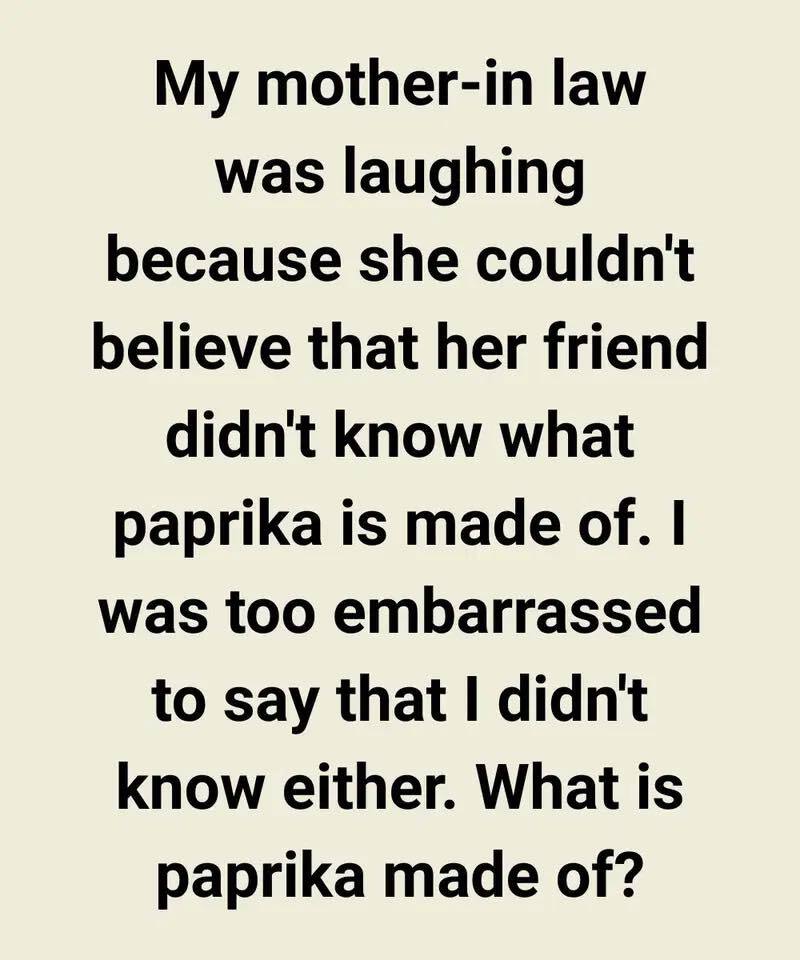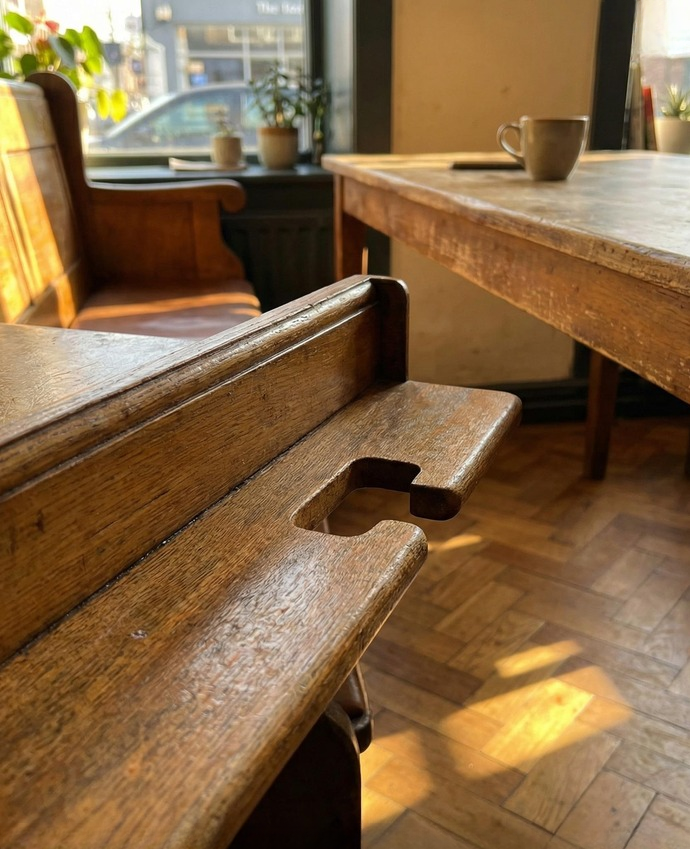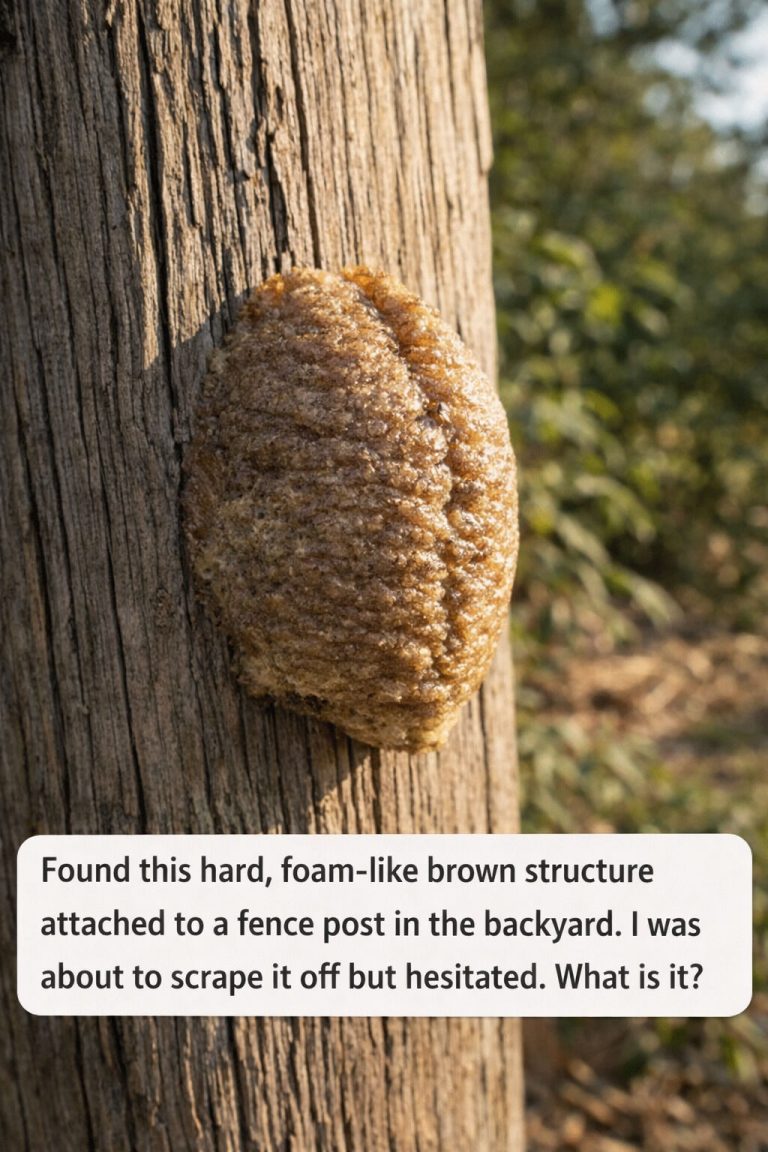
My mother-in-law was laughing because she couldn’t believe that her friend didn’t know what paprika was made of.
I was too embarrassed to admit that I didn’t know either.
So I sat there quietly, nodding along as if I had known all my life. But inside, my curiosity was eating me alive.
That night, I pulled out my phone and searched for the answer. When I read that paprika is simply ground dried peppers, I felt both relieved and a little silly.
But the story didn’t end there.
The next morning, I decided to show off my newfound knowledge at breakfast. I casually mentioned, “Did you know paprika is just ground red peppers?”
My mother-in-law looked at me with a smirk and said, “Yes, but did you know which kind of peppers?”
I froze. She leaned in closer, her voice playful yet oddly sharp, “Some are sweet… and some are deadly hot. You better hope you never mix them up.”
I laughed nervously, but in her eyes, there was something else—something that made me wonder if this conversation wasn’t just about spices at all.
Also Read : MY LITTLE BROTHER REFUSES TO SLEEP IN HIS BED — HE SAYS THE COW KNOWS THE TRUTH
I froze mid-bite, the fork still hovering near my mouth. Her words didn’t sound like a harmless cooking fact anymore—they lingered in the air like smoke, curling into the corners of my mind.
“Some are deadly hot.”
She sipped her coffee, eyes locked on me, as if waiting to see if I understood the weight behind that statement.
I forced a laugh. “Well… I’ll be sure to read the label next time.”
Her smirk widened just slightly. “Good. It’s important to know exactly what you’re putting in someone’s food.”
The conversation shifted after that, but I couldn’t focus. My mind kept circling back to her tone—half joke, half warning.
Later that afternoon, I wandered into the kitchen to make tea. She was there, standing at the counter, carefully pouring a small mound of deep crimson paprika into a little glass jar.
“That’s not the store-bought kind,” I said casually.
She didn’t look up. “No. This is… homemade.”
I stepped closer. “From your garden?”
She gave the smallest of smiles. “You could say that.”
The jar’s label was handwritten in perfect cursive: Special Mix. There was no date, no ingredients—just those two words.
She caught me looking. “Would you like to try some? I could sprinkle it on your tea, just a pinch. It warms the blood.”
I swallowed hard. “Maybe another time.”
That night, lying in bed, I couldn’t shake the image of that jar. Something about it gnawed at me.
A week later, during Sunday lunch, she brought out a steaming pot of stew. The rich aroma filled the room, but there was an underlying sharpness to the scent that made my stomach knot.
“Special recipe,” she said, ladling generous portions into everyone’s bowls.
When it came to mine, she hesitated just slightly, almost imperceptibly, before setting it in front of me. I noticed the paprika jar sitting beside her on the counter, the same one from before—half empty now.
Halfway through the meal, her friend Marlene—the same one she’d laughed at for not knowing what paprika was—set down her spoon. “This is… spicy,” she said, dabbing her lips with a napkin.
My mother-in-law chuckled. “Oh, don’t worry. This one’s the sweet variety.”
Her eyes flicked to mine when she said it.
That night, I couldn’t sleep. Around midnight, I crept downstairs, driven by equal parts fear and curiosity. The kitchen was dark except for the faint moonlight filtering through the curtains. I opened the spice cupboard—no jar.
I checked every drawer. Nothing.
Then, from the shadows, her voice: “Looking for something?”
I turned. She was standing in the doorway, robe tied neatly, holding the jar in her hand.
I stammered. “I… couldn’t sleep. Thought I’d make tea.”
She stepped forward, her slippers silent on the tile, and set the jar down between us. “Do you know why paprika is my favorite spice?” she asked softly.
I shook my head.
“Because it hides in plain sight. People think it’s harmless. They don’t notice how much is in their food until it’s too late.”
Her smile didn’t reach her eyes.
I backed toward the doorway, my hand brushing the light switch. “I should get back to bed.”
She tilted her head, studying me like I was a puzzle she had almost finished solving. “Yes,” she whispered. “Rest. You never know what tomorrow will bring.”
The next morning, my husband told me his mother was going to make her “special stew” again for dinner.
Only this time, she wanted me to help her cook it.
Also Read : MY SON HAS A NEWBORN AT 15 — BUT THAT’S NOT THE PART I’M STRUGGLING WITH
The day felt heavier than usual. I couldn’t shake the thought of standing beside her in the kitchen, the jar within arm’s reach, her eyes on me the entire time.
By late afternoon, the smell of chopped onions, garlic, and simmering broth filled the air. I stood across from her at the counter, knife in hand, while she measured spices with delicate precision.
When she reached for the paprika jar, I noticed her grip—tight, almost protective, like it was more valuable than gold.
She tipped a little into the pot. The stew darkened into a deep, rich red. “Smell that,” she said, holding the wooden spoon toward me.
I leaned closer, catching the warmth of peppers—but there was something else. Something faint, metallic.
She must have seen the flicker in my eyes. “Go on,” she murmured, “take a guess.”
I shook my head.
Her smile was slow, deliberate. “You know, in old villages, paprika wasn’t just for flavor. Sometimes it was used… to hide things.”
She turned back to the pot, stirring. “The right blend masks bitterness. Even the sharpest tang of… well, certain powders.”
My stomach turned.
Before I could respond, she slid the jar toward me. “Your turn. Add some. Be generous—flavor is everything.”
I hesitated, my hand hovering over it. “What’s actually in here?”
Her eyes locked on mine. “You’ve eaten it before,” she said simply.
The words hit like a slap.
I thought back—every meal she’d cooked since I married her son. The stews, the roasts, the sauces. That same warm red tint. That same faint metallic note.
I set the jar down slowly. “What have you been feeding us?”
Her smirk vanished. For the first time, her voice was cold. “Not us. Just the ones who don’t belong.”
A distant memory surfaced—the neighbor who stopped visiting suddenly, the cousin who fell mysteriously ill after staying with us.
She turned off the stove, lifted the spoon, and let the stew pour back into the pot. “You asked what paprika was made of,” she said softly. “I told you—sweet or deadly. The difference is knowing which is which.”
That night, I didn’t eat dinner. But I watched her serve everyone else, watched them take bite after bite while she met my gaze across the table.
Her son—my husband—smiled at her with the same blind trust I once had.
And as the meal went on, I realized two things:
- I could never tell him.
- If I did… she might decide I no longer belonged.



